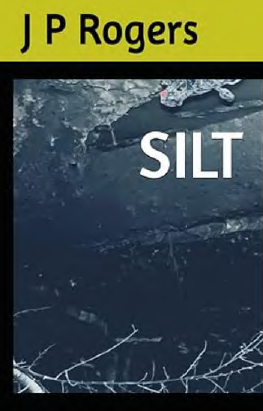You Know Where They Are
Published in: 33. Transcription of MultitudesJohn P. (JP) Rogers is a New Yorker by birth who now resides in Kansas. He has also lived in Boston, Paris, Dublin and San Francisco. For some reason, he’s been writing poems and stories since he was eight years old. He studied English and Philosophy at university and has worked as an editor for 25+ years. He is extremely confused by life and feels it is far too expensive relative to the level of joy attainable. He wishes many things were different.

FROM THE COLLECTION SILT

THEY
They will always make it seem as if they know better than you
When they tire of that, they cry and act hurt if it gains them
something — forever lashing out from smaller places, trying to
defend what they only presume. They suck the night in deeper,
and leave you with just a sliver of moon. “Fine,” you think,
“Have Big Mind, swallow this tablet — it’s seven day’s worth of
humility.” Let it dissolve in your ear. Let your ear dissolve the
dirt. This is the dirt they will bury you in. They will smile at you
there, tucked under planet-skin, swimming in the red dirt like a
backwards Jesus, getting nowhere. They’re always smiling
somewhere. You know where they are. You know where they
are all the time — the sound of the ice clinking in their glasses
may as well be a bell on a kitten’s neck. They are all around
you, and they know nothing. But they will always make it seem
as if they know everything you don’t.
AMNESTY
I often think of granting myself amnesty
wiping spent thoughts and scattering
the past; its wounds shed, sins absolved
(mine and the world’s). Scrap everything
and live now on a new earth, poles reversed,
magnetic field flipped, forgetting
even how I came to be this smooth
new animal untouched by regret.
When it happens, my mind will breathe
a pure moist silence to sweep away
those grinding days on dead necks
craned to spy on all hearts, and those nights
where in the slow hands of worry
I slept on dirty mounds that sang my name
and would wake, dazed, in the same salty skin
only to think again of granting myself amnesty.
DRAMA
We watch because we cannot help it. Each day it unfolds right
there in the front room of the house of time, with singular
purpose — a deliberate show of affection for everything and its
opposite. This is improvisation. There is no script or storyline
to follow, no routine to fall back on. Just us and this blunt
spectacle, with only the instrument of cognition to process it
all. The toolbox on the floor is filled with broken handles,
headless things good for holding, but little else. The absence of
structure is startling. The walls that used to keep things
separate have been translated out of existence; we are now
free to become our own children. Does this drama include its
own justification? For those who notice such things, there are
three books on the table. One is all covers, and the second has
feathers where the pages should be. It is the third one that
speaks as we look on. This is the narrator, spewing dust into
our ears and eyes, but the message inside is clean: We watch
because it is not over, and the tickets have already been paid
for.
TIME
If I hold on a minute too long, I can’t sense it any more — time, I
mean, cast as a net for gathering everything else’s name.
Mistakes in judgment are likely to occur as the blizzard of data
that feeds us changes — silk to liquid and back.
What’s this called again? A condition or set of symptoms that
can be identified and pressed into the one true shape of matter,
something like a clock embryo in a shot glass. What I mean to
think — what we all do, really — is that it’s too hot inside this
ongoing embrace, and time will stop at nothing to make us half
again.
BECAUSE I AM TRYING TO SOLVE MY PROBLEMS WITH LOVE
1. I will grab a fresh eraser; we all know me too well. I can
become something else tomorrow. Perhaps a chicken
or a dog — nothing too exhausting.
2. Threats are multiplying all the time. Our friends live in
mortal fear they are going to be reupholstered. They
know the exact date.
3. There are turtles that can approximate love for
decades. Such things offer hope that we can overcome
our lives. Love, as a tool, has so many opposites, but I’m
keeping track of them… Will you help?
4. The mind and tongue form a deceptively simple
machine: silence goes in; misunderstanding comes out.
Or vice versa.
5. The day it was announced that hope was an incurable
condition, we began waiting for instructions on how to
proceed. Nothing has come yet. I check the mailbox
every morning.
AWAY
We are us. Part of us is not us. On balance, or off — the same is
not different. Our velocity is suspect. We taste doubt in the
wind (it’s metallic). What we’re now thinking smells rotten
because of goodbye. The ideas we can afford are not
constructive. An end begins because everything is allergic to
time. I wish these boots wouldn’t fit anyone. All can be the
same if we let it — but we don’t. It’s not in our nature to be said,
swallowed or unseen. Sometimes a thing continues without itself.
EIGHT SENTENCES
* Beginnings and ends are simply two different views of
the same thing.
* The space between a question and an answer has no
name — or does it?
* I don’t know why sometimes we seem to want back
what wasn’t ever ours.
* It takes substance just to understand the realm of the
spiritual.
* The relationship between life and death is constantly
evolving.
* I was in the same boat as you right before you drowned
— but I got out.
* Human beings are quite often present and gone in
equal measure.
* It’s ironic that what you choose to ignore says so much
about you.

Speak Your Mind